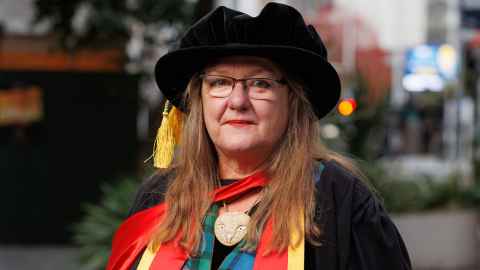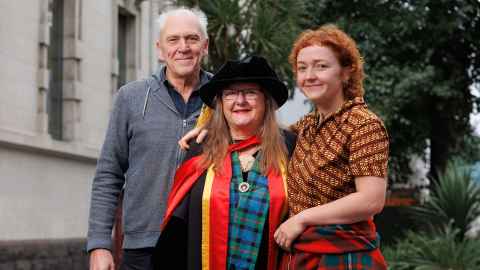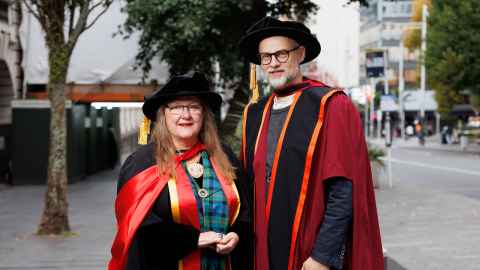Filmmaker Mairi Gunn's journey has always been the same: to strengthen the connection between the audience and the person facing the camera. Her doctoral research takes it one step further.

Mairi Gunn's career could have taken a very different path. When she was only 19, she graduated with a Bachelor of Science from the University of Auckland. Driven by the pursuit of knowledge, Mairi then enrolled in a Bachelor of Arts, specialising in philosophy and languages.
It was early in her BA journey when Mairi found her true calling.
"I became the photographer for Cracuum magazine that year," she says, "and that led me to join the film and television industry. I enjoyed the hands-on aspect."
Since then, Mairi built her reputation as a renowned filmmaker, working on film and television projects underpinned by the power of human connection and empathy - a theme that she revisits even in her academic career.
Concurrently, Mairi completed a Bachelor of Art and Design (Hons) and a Master of Philosophy at AUT to learn more about human connection as understood through other disciplinary lenses, like te ao Māori and human ecology. When her daughter was born, she decided to focus on teaching her craft, drawing from her own experience and industry knowledge.

In 2016, Mairi received a scholarship for a PhD at the University of Auckland, which saw her collaborating with multiple supervisors and colleagues at different stages of her doctoral journey. In 2021, she began to teach in the University's Bachelor of Design programme, encouraged by her many mentors.
"My mentors believed in me," she says. "They kept on telling me that I could do it and that the University needed me."
In the first year of her PhD, Mairi didn't know how her journey was going to unfold, but she knew where she wanted to go.
"I wanted the audience to really feel the emotion of whoever was facing the camera," she says. "That's always been my journey; to capture and strengthen the empathic connection behind the lens - only the technology has changed."
With over three decades of filmmaking, Mairi was attuned to technological advancement within the film and television industry. For the PhD, the one that piqued her interest was extended reality (XR) and virtual reality (VR).
Mairi's PhD orbited around her XR installation, which looked at 'intercultural discomfort' and how it can be overcome. It's fitting that this research was also supported by Auckland Bioengineering Institute's (ABI) Empathic Computing Laboratory, which looks at how technology can enable people to better understand each other.

"I wanted to overcome this thing about people who look different," says Mairi, "and so I wanted people to get used to the idea of being in close proximity."
"Imagine what happens when the wave (because of climate change) has receded, and you find yourself clinging to the hull of an upturned boat. You're looking at the only other survivor, also holding onto the boat, and they don't look like you. But you'll need to work together to get through the challenges we're faced with now, especially with climate change."
The installation was also driven by her own experience in the film and television industry in the mid-1980s when she was one of the very few female filmmakers. An unfortunate reality for her was experiencing sexism first-hand, whether through misogynistic comments or systemic exclusion.
"I've been battling gender inequities right from the start," says Mairi. "When I became a cinematographer after a 10-year apprenticeship, I was the only woman in that role. Female cinematographers still aren't normalised, even though we are finally seeing a lot more women today."
Mairi credits both her supervisors, Mark Billinghurst (Director of the Empathic Computing Lab) and Angus Campbell (Head of the Design programme) for giving her the platform to create her installation.
"They both understood what I hoped to achieve. Mark gave me a secure spot in the lab and an opportunity to work with amazing collaborators. Working with scientists took me on a whole other adventure!"
I wanted the audience to really feel the emotion of whoever was facing the camera. That's always been my journey; to capture and strengthen the empathic connection behind the lens - only the technology has changed.
The relationship Mairi shared with her collaborators at the lab was a perfect marriage between pragmatism and creativity.
"Scientists really like to work with designers and artists," she says. "It's like they're building a car, but I decide who's driving the car, who the passengers are and where they're going."
But the PhD journey didn't come without its challenges. Between the impact of Covid-19 and her supervisors leaving the University, Mairi also had the logistical challenge of getting every component of her PhD aligned.
"I think there was a misconception for a while that creative and practical components of your research meant that that you were having an easier time," […] "but in fact you've got your 60,000-word thesis, your practical, creative component and organising their exhibition - it's a challenge. But I wouldn't have done it otherwise."
Now that she's completed her doctoral journey, Mairi wants to apply her research to advocate for prison reforms and more.
"I really believe in people. I believe in humanity and being human, so my priority has always been people before technology. It's about overcoming appearances, which are only superficial. For me, values and integrity are important. Integrity is authenticity and it's when everything is harmonised, is complimentary. There are no falsehoods. Attitudes, beliefs and actions match."
At the end of the day, Mairi's story isn't about how to be human in a virtual world - it's about how virtual reality can be used as a tool to bring humanity closer to one another, despite our differences.
Story by Shreta Rayan






